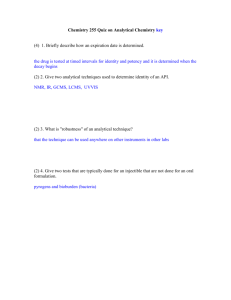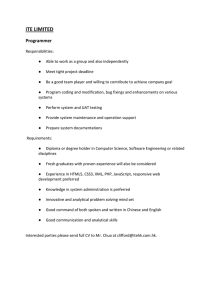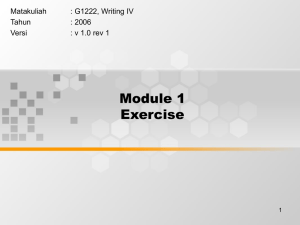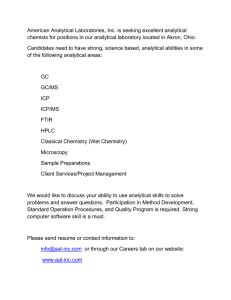Module 1 What is a research paper? Matakuliah : G1112, Scientific Writing I
advertisement
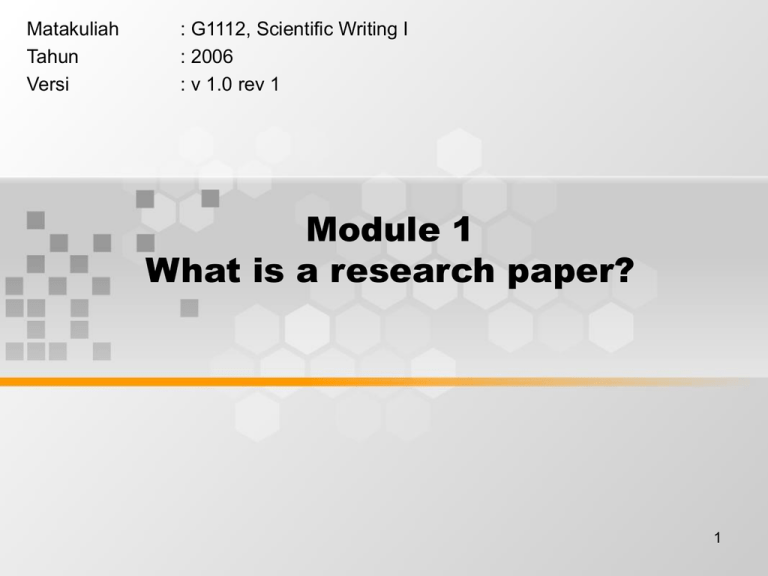
Matakuliah Tahun Versi : G1112, Scientific Writing I : 2006 : v 1.0 rev 1 Module 1 What is a research paper? 1 Definition “ A research paper is a piece of academic writing that requires a more abstract, critical, and thoughtful level of inquiry than you might be used to” (Sarah Hamid) http://owl.english.purdue.edu/workshops/hypertext/ResearchW/what.html 2 Reasons Why do Research? 1. Research teaches methods of discovery 2. Research teaches investigative skills 3. Research teaches critical thinking 4. Research teaches logic 5. Research teaches basic ingredients of arguments. 3 Research Papers Research papers come in all shapes, sizes, forms, and disciplines. 4 Genre of Research Writing • To analyze or to argue? A finished paper should be a presentation of researcher’s own thinking backed up by the ideas or information of others in the field. However, whether the paper is ANALYTICAL (uses evidence to analyze facets of an issue) or ARGUMENTATIVE (uses evidence to attempt to convince the reader of your particular stance on a debatable topic), is definitely going to have a bearing on the strategy from here on in. This will determine the paper's purpose. 5 Analytical Papers “To analyze means to break a topic or concept down into its parts in order to inspect and understand it, and to restructure those parts in a way that makes sense to you.” In an analytical research paper, you do research to become an expert on a topic so that you can restructure and present the parts of the topic from your own perspective." 6 Analytical Papers • A researcher have to go into the researching stage with a specific topic about which you have not made any kind of conclusions. Often this is called as research question. 7 Analytical Papers Task • Your task is to survey the information and views already out there--both before and once you become familiar with the topic. • That will require critical thinking and reading, plus evaluation of the resources you handle. 8 Analytical Papers Result • By the end of the paper you will be able to contribute your own thoughts to the academic discussion by drawing some conclusions about the topic you have just analyzed. 9 Analytical Papers Conclusion “Your task is to survey the information and views already out there--both before and once you become familiar with the topic. That will require critical thinking and reading, plus evaluation of the resources.” 10 Argumentative (or Persuasive) Papers “In direct contrast to the analytical paper, your approach here is to take a stand on an issue and use evidence to back-up your stance, not to explore or flesh out an unresolved topic.” 11 Argumentative (or Persuasive) Papers • Argumentative or persuasive papers, as these names suggest, are attempts--after all, essay does come from the French word essai, or "attempt"--to convince the reader of a debatable or controversial point of view. 12 Argumentative (or Persuasive) Papers • Convention has it that theses are generally found in the introductory paragraph(s), which makes sense considering your reader will get frustrated if your persuading point isn't stated early on. This is why guides to true ANALYTICAL papers--even our short description above--avoid using the word "thesis" altogether and describe you as "drawing conclusions." They recognize that your critical evaluations, insights, and discoveries are going to be located toward the end of the paper and so are not theses in the true sense of the word. 13 Who’s the audience • Before writing, a researcher should consider the audience: • Do not make " Too narrow or too broad” intention such as: "society in general," "everyone with a college education," or "any scholar or academic. • Deciding your audience will give you a clear focus of your research. 14 Who’s the audience Example ...imagine your instructor as representing a larger academic audience. That audience often expects something like what appears in academic journals that share original research with members of the community. Writing should make a new contribution to the knowledge of a given field. Therefore, you need to appear serious about the subject matter. You take on a role as an entering member of the academic community... You are establishing a relationship between yourself and a larger audience, not simply between you and your instructor." 15 Conclusion “The final product will be a unique and appropriate integration of evidence you have located outside yourself and personal insights.” http://owl.english.purdue.edu/workshops/hypertext/ResearchW/what.html 16

